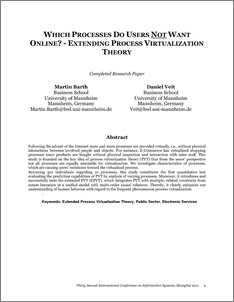|
Which Processes Do Users Not Want Online? - Extending Process Virtualization Theory
Barth, Martin
;
Veit, Daniel J.
![[img]](https://madoc.bib.uni-mannheim.de/29991/1.hassmallThumbnailVersion/Barth_and_Veit_-_2011_-_Which_Processes_Do_Users_Not_Want_Online_Extendin.pdf)  Vorschau |
|
PDF (Full Text)
Barth_and_Veit_-_2011_-_Which_Processes_Do_Users_Not_Want_Online_Extendin.pdf
- Veröffentlichte Version
Download (767kB)
|
|
URL:
|
https://ub-madoc.bib.uni-mannheim.de/29991
|
|
Weitere URL:
|
http://aisel.aisnet.org/icis2011/proceedings/human...
|
|
URN:
|
urn:nbn:de:bsz:180-madoc-299918
|
|
Dokumenttyp:
|
Konferenzveröffentlichung
|
|
Erscheinungsjahr:
|
2011
|
|
Buchtitel:
|
Proceedings of the International Conference on Information Systems, ICIS 2011
|
|
Seitenbereich:
|
Paper 20
|
|
Veranstaltungstitel:
|
32nd International Conference on Information Systems (ICIS)
|
|
Veranstaltungsort:
|
Shanghai
|
|
Veranstaltungsdatum:
|
06.12.2011
|
|
Ort der Veröffentlichung:
|
Atlanta, Ga.
|
|
Verlag:
|
AISeL
|
|
ISBN:
|
978-0-615-55907-0
|
|
Sprache der Veröffentlichung:
|
Englisch
|
|
Einrichtung:
|
Fakultät für Betriebswirtschaftslehre > Dieter-Schwarz-Stiftungslehrstuhl für ABWL, E-Business u. E-Government (Veit 2006-2013)
|
|
Fachgebiet:
|
380 Handel, Kommunikation, Verkehr
650 Management
|
|
Freie Schlagwörter (Englisch):
|
Extended Process Virtualization Theory , Public Sector , Electronic Services
|
|
Abstract:
|
Following the advent of the Internet more and more processes are provided virtually, i.e., without physical interactions between involved people and objects. For instance, E-Commerce has virtualized shopping processes since products are bought without physical inspection and interaction with sales staff. This study is founded on the key idea of process virtualization theory (PVT) that from the users’ perspective not all processes are equally amenable for virtualization. We investigate characteristics of processes, which are causing users’ resistance toward the virtualized process. Surveying 501 individuals regarding 10 processes, this study constitutes the first quantitative test evaluating the prediction capabilities of PVT by analysis of varying processes. Moreover, it introduces and successfully tests the extended PVT (EPVT), which integrates PVT with multiple, related constructs from extant literature in a unified model with multi-order causal relations. Thereby, it clearly enhances our understanding of human behavior with regard to the frequent phenomenon process virtualization.
|
|
Zusätzliche Informationen:
|
Online Ressource
|
 | Dieser Eintrag ist Teil der Universitätsbibliographie. |
 | Das Dokument wird vom Publikationsserver der Universitätsbibliothek Mannheim bereitgestellt. |
 Suche Autoren in Suche Autoren in
Sie haben einen Fehler gefunden? Teilen Sie uns Ihren Korrekturwunsch bitte hier mit: E-Mail
Actions (login required)
 |
Eintrag anzeigen |
|
|
